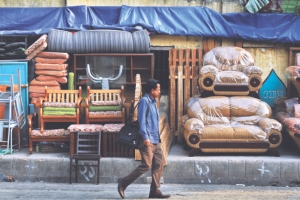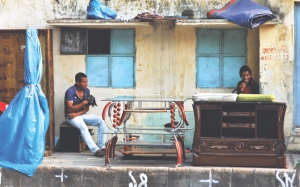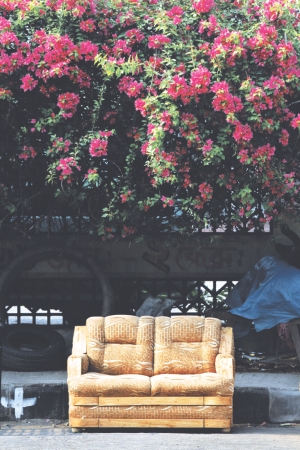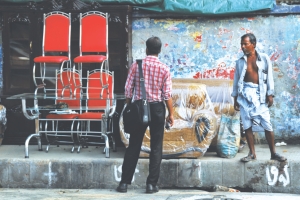| Home - Back Issues - The Team - Contact Us |
 |
| Volume 11 |Issue 17 | April 27, 2012 | |
|
|
Economy One Man's Trash- The second-hand goods (bhangari) market in Dhaka, although hardly in the limelight, is a money spinning business. Sharmin Ahmed
It all starts with the street vendors balancing weighing scales on their shoulders, often roaming the streets, ready to buy plastic bottles and paper and old books. Long ago, they would barter these recyclables for kotkoty (jaggery candy), onions and even pickles. Now they pay in cash. Street vendors are usually employed by local area based bhangari entrepreneurs and are paid in advance on a daily basis. They earn up to Tk 4000 a day, depending on the level of trust and length of service they provide for their employers. Vendor Mainul Islam buys newspapers, plastic materials and metal goods such as old steel taps and even door knobs. Whatever material he buys are measured in kilograms and paid at a fixed rate for each kilogram bought. At the end of the day, he deposits them at the local bhangari shop that he works for, often getting a bonus if he can provide more than the usual amount of goods. Every locality in Dhaka has bhangari shops that collect almost everything, including paper, metals, plastics etc. They usually employ two to five people in their shops for sorting and ten to fifteen vendors for collection purposes. They enjoy credit facilities such as payments in advance, from big specialised bhangaries and extend credit facilities to their own employees. The monthly turnover for such bhangaries can be as high as Tk 1.5 lac. Mohammed Majnu Miyah, who owns a small bhangari shop at Kolabagan, buys cartons, old newspapers, plastics and other old materials from street vendors and rag pickers who are mostly children and destitute people who collect recyclable materials from dustbins and dump sites. Majnu says, "I collect them and sell them to the big dealers at the Bhangari market in Naya Bazaar, Old Dhaka. From there the factories buy these materials in bulk." He further explains that he usually sells them to the bhangari shops at Tk 5 profit margin for every kilogram. Majnu also adds, “These materials will change many more hands before they end up in the factories and by then their prices will have changed that many times." There are also specialised bhangari shops clustered mostly in old Dhaka. They usually specialise in single recyclable material be it paper, plastic, or iron. They have five to eight people working round the year. Each specialised bhangari has business contacts with 20 to 30 area based bhangari all over the country to ensure a consistent flow of recyclables; sometimes they are supplied by brokers. These businesses too make quite a huge amount of profit by selling their products to factories. Often, they have to undertake further upgrading, in some cases processing the materials before selling them to recycling industries directly or through brokers. Due to the fluctuating demand in the market, sometimes the bhangari shops need to store their products for a more convenient season/time to make higher profit.
At Yunus Furnitures, in Kalabagan, both old and new furniture are bought and sold. A sofa-set which is bought at Tk 12,000 can be sold at double that price. The owner of the shop, Mohammed Yunus, says, "If you want to buy one piece of furniture like a chair; it is weighted in kilograms sold at a fixed rate. However, the furniture's design and condition will also determine what the price should be." As is often the case, old furniture is usually broken or discoloured, so they have to be mended and polished, the cost of which is retained by the seller who charges fifty percent of the cost, on top of the product price. Such a trade of second-hand materials is not only profitable for shopkeepers and street vendors, but they are also a way to make some extra cash by many households. Nazma Akhter, who is a housewife living in Uttara, sold her refrigerator to such a bhangari shop. She says, “I sold my ten-year-old fridge at Tk 7000, I had bought it with Tk 30,000, this I think is a good price.” The policy is thus resale, reuse and make a profit by doing so. On the other hand, it is quite easy to be fooled into buying old goods at the price of new ones. There have been many cases where old furniture were polished and sold as new. Hence, as a customer one must be very careful. It is better not to go to bhangaries if you are not aware of the quality, price ranges and do not have good bargaining skills. Nazma advises, “If you are not skilled in the trade, you are likely to get a bad price, it is always better to get a second opinion, my driver who has been involved with bhangaries, helped me find a dealer.” In addition, there are other underlying issues with these markets. Those who are at the bottom of the list are often exploited. The street vendors and rag pickers who do the lion's share of the job and are exposed to hazardous environments, and are typically the least paid. A small allowance is all they take home everyday, while the big bhangari traders make huge profits out of their products. Moreover, given that such businesses are more often than not registered with any regulatory body or trade association, they cannot be monitored or regulated by the state. Most of the bhangaries in Kolabagan do not even have name plates or placards, forget a licence for trade. Hence, even if the trade is fraudulent, it is not easy to take legal actions against them. Nonetheless, nowadays there are sites like www.clickbd.com, which is an internet shopping hub in Bangladesh for both old and new goods. These websites might be the next big substitute to the bhangari business and be less exploitive of both the environment and people. However, so far people have been only using it to buy or sell second-hand electronic goods. Adil, a student at a local private university, says, “Bought and sold materials can be found on such sites. You can post details about something you want to sell and include a picture of it, with the price and other details and post your contact number. People who check out the site can see it and find what they want to buy and wish to negotiate prices, will call you. It is not a buying forum per se, just a big online billboard. The actual transaction takes place in person, but it's a good way to check out the items.” Often what we throw away as waste materials, are those that feed thriving businesses, generate and inject money into the economy. The bhangari market is definitely an example of profitable if not efficient waste management in Dhaka. The state must come forward to find ways in which it can be monitored and regulated efficiently to make it more profitable.
Copyright
(R) thedailystar.net 2012 |



